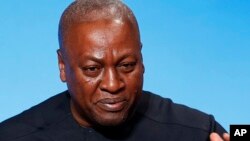Blackouts have hit West Africa's second-largest economy again, and Ghana's president is blaming saboteurs in Nigeria's distant oil-producing Niger Delta region for the power cuts.
Ghana was once one of West Africa's fastest-growing economies, but power shortages, government overspending and drops in the price of its major commodities led to years of slowing growth and a nearly $1 billion IMF bailout.
In a speech last week, President John Dramani Mahama blamed recent power outages on disruptions in the supply of Nigerian crude oil that was meant to power Ghana's plants.
"Because of sabotage in Nigeria in the terminals, crude oil that we ordered in Nigeria last month has not arrived. And so it has created some generational problems for us," Mahama said.
The sabotage Mahama is referring to started earlier this year, when a militant group calling itself the Niger Delta Avengers began blowing up pipelines and other facilities in the Niger Delta.
That dropped Nigeria's oil output from around two million barrels per day to 1.5 million per day, and is one of the major reasons why economists believe Africa's largest economy is poised to enter a recession.
Ghana’s role
Despite the damage pipeline saboteurs have done to Nigeria, analysts say it's a stretch to also blame them for Ghana's woes.
Mohammed Amin Adam, executive director of the Africa Center for Energy Policy in Ghana's capital Accra, says shortfalls in Ghana's production of natural gas for its plants, along with low water levels in its hydroelectric dams, have done far more to undermine the country's power grid than delayed shipments of Nigerian crude.
"Our president should be a little bit diplomatic, rather than blaming Nigeria," Adam said.
Ghana also used to get Nigerian natural gas though a pipeline that ran along the West African coast, but the pipeline company stopped supplying to Ghana last month because it owed Nigeria's gas company $180 million.
"While the insurgency in Nigeria may account for some disruption in the supply of crude oil to Ghana, [the] same cannot be said to account for the curtailment of gas supply to Ghana," said Steve Manteaw, chairman of the Civil Society Platform on Oil and Gas.
He called the buying of crude oil a "stop-gap measure" while the government finds ways to restart the supply of natural gas to its power plants.
Power key to growth
Ghana is the second-largest grower of cocoa in the world and Africa's second-biggest gold producer. It is also an oil-producer, but its usual production of 104,000 barrels per day has fallen to around 40,000 barrels per day because of problems with its offshore oil facilities.
Widespread electricity disruptions are one reason for the country's recent financial troubles. Growth fell to 3.4 percent in the last year, from 14 percent in 2011.
Mahama is standing for a second term in office in elections expected to be held this November.
He has campaigned on turning the economy around, but Sampson Akligoh, managing director of Accra-based investment bank InvestCorp, says that may be difficult to accomplish if power disruptions continue.
"A return to load-shedding and erratic power supply would have a significant effect on the economy," Akligoh said.


